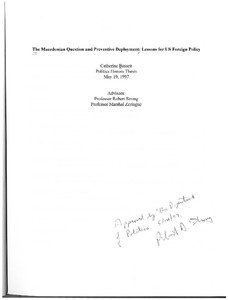| dc.rights.license | In Copyright | en_US |
| dc.creator | Bassett, Catherine Garland | |
| dc.date.accessioned | 2023-04-21T19:15:35Z | |
| dc.date.available | 2023-04-21T19:15:35Z | |
| dc.date.created | 1997 | |
| dc.identifier | WLURG038_Bassett_thesis_1997 | |
| dc.identifier.uri | https://dspace.wlu.edu/handle/11021/36109 | |
| dc.description.abstract | Preventive diplomacy and deployment are part of a larger policy debate. The desire to do something, the fear of doing it wrong, and the inertia of doing nothing at all have surfaced now that changes in the international climate have forced changes in US foreign policy. We have alternatively heard calls for increasing interventionism now that the constraints of bipolarity are gone and increasing isolationism now that the threat of the Soviet Union has disappeared. Preventive diplomacy proponents contend that the policy recommendations offered thus far are too narrow and restrictive to cope with the changing security environment. They believe that preventive diplomacy policies offer an alternative to extremes of intervention and isolation. They argue that their policies are tailored to an era of decreasing budgets and increasing demands. While the US would remain involved and engaged around the globe, it would do so at a considerably reduced cost. Their argument is intriguing, especially when tested in its extreme forms (preventive deployment) and around the margin (in areas of questionable relevance to the US). Of the numerous conflicts and crises in the world, I have focused on one case to examine the application of preventive diplomacy, specifically preventive deployment. [From Introduction] | en_US |
| dc.format.extent | 109 pages | en_US |
| dc.language.iso | en_US | en_US |
| dc.rights | This material is made available for use in research, teaching, and private study, pursuant to U.S. Copyright law. The user assumes full responsibility for any use of the materials, including but not limited to, infringement of copyright and publication rights of reproduced materials. Any materials used should be fully credited with the source. | en_US |
| dc.rights.uri | http://rightsstatements.org/vocab/InC/1.0/ | en_US |
| dc.subject.other | Washington and Lee University -- Honors in Politics | en_US |
| dc.title | The Macedonian Question and Preventive Deployment: Lessons for US Foreign Policy | |
| dc.type | Text | en_US |
| dcterms.isPartOf | WLURG38 - Student Papers | |
| dc.rights.holder | Bassett, Catherine Garland | |
| dc.subject.fast | Deployment (Strategy) | en_US |
| dc.subject.fast | Europe -- Macedonia | en_US |
| dc.subject.fast | Macedonia -- Ethnic relations | en_US |
| dc.subject.fast | Macedonia -- History | en_US |
| dc.subject.fast | United States -- Foreign relations | en_US |
| local.department | Politics | en_US |
| local.scholarshiptype | Honors Thesis | en_US |
